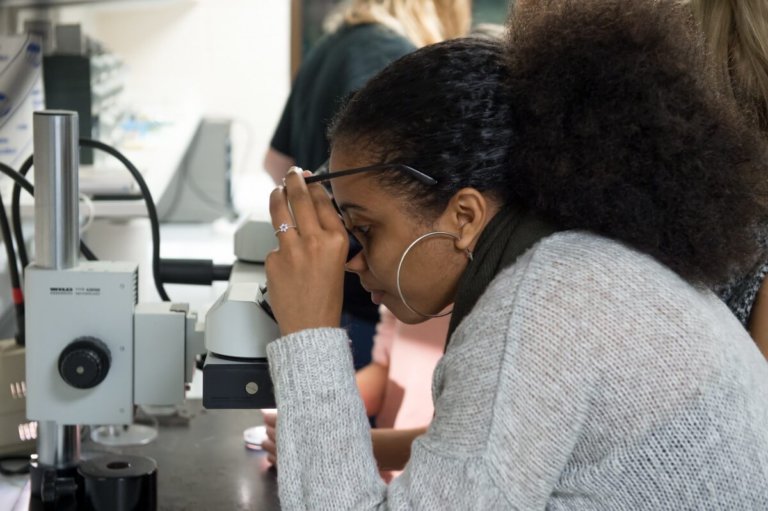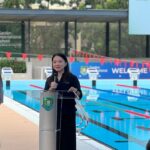
In universities across the globe, students pursue cutting-edge research alongside faculty, breaking ground in their specialist areas of science.
Some universities are driving change and impacting society, enabling students to investigate some of the world’s great challenges.
When it comes to the life sciences, students learn through research-led teaching and apply their learning to research projects that will make a difference in the world.
At the same time students learn skills like responsibility, innovation, creative thinking and collaboration.
At the University of Sussex School of Life Sciences, students learn in a diverse community. Here teaching is focused on research and on developing the skills needed for a career as a scientist and innovator.
Students gain in-depth knowledge in their area of life sciences and become skilled in laboratory work and data analysis.
They engage with diverse fields such as cancer biology, drug discovery, neuroscience and biodiversity, learning how to work in skilled teams across subject boundaries – just as in the working world.
Students at this school get plenty of opportunities to work alongside researchers who are making a difference, including a biologist attempting to save one of the world’s rarest primates, a biochemist using one enzyme to protect global food security and human health, and a chemist exploring the cosmos from her lab.
Preserving the rainforest with ethical chocolate
For many years, it has been Dr Mika Peck’s mission to rescue the brown-headed spider monkey from extinction, but his work is not simply about saving a single species. These monkeys’ fate depends on the survival of the Ecuadorian Chocoan rainforest, and their future is linked with the livelihoods of local people.

The Ecuadorian Chocoan rainforest is one of the most biologically rich habitats on Earth. The critically endangered brown-headed spider monkeys that live there are key to maintaining a healthy ecosystem.
By working with local cacao farmers to reduce logging, The Chocó Project represents one small but important step in saving the world’s ecosystems. A joint initiative of Dr Peck’s lab, Washu Chocolate, and Fundación Jocotoco, a local rainforest trust, has established a nature reserve in Tesoro Escondido.
The Chocó Project promotes conservation strategies to schools and cacao producers in the local community to raise awareness of the challenges faced by the rainforest and its people.
Local farmers who produce cacao have signed an agreement with the project to protect the forest and improve the cacao quality of Tesoro Escondido. In return, they have access to fair markets for their product. Logging is no longer necessary so the brown-headed monkey and its ecosystem are protected.
Protecting global food security and human health
Another shining example is Professor Tony Moore’s impressive 40 years of research into one unusual enzyme – the alternative oxidase (AOX) – which has opened a path to new fungicides and anti-parasitic medication.
Working with the University of Nagasaki in Japan, Professor Moore solved the crystal structure of AOX, allowing his team to make highly specific AOX inhibitors that could act as fungicides to protect crops, benefitting food security worldwide.
Professor Moore’s research also has applications to human health. A number of parasites rely on AOX, including those which cause sleeping sickness. The team at Sussex and Nagasaki Universities have helped chemists design compounds that can target the parasite’s AOX enzyme, to provide an effective control of this neglected disease.
Initial tests show that the compounds designed by Professor Moore can also be used to control the threat of Candida auris, a multidrug resistant fungus which causes life-threatening infections and is spreading rapidly in hospitals worldwide.
Exploring the cosmos in the lab
In Astrochemistry, Professor Wendy Brown makes an impact by investigating the chemical reactions that create planets and stars.

Professor Wendy Brown – University of Sussex School of Life Sciences
Professor Brown’s laboratory reproduces the conditions of deep space to investigate chemical reactions that occur far beyond the Earth, helping us understand how planets formed and the origins of life itself.
She said, “Here at Sussex, we can simulate the conditions of space in the lab using graphite as model dust grains and then process the molecules using UV radiation, heat or electron irradiation.
“We work with Engineering academics to examine how electron irradiation has affected the ice systems of Europa (a moon of Jupiter). We can then use standard techniques to analyse the molecules and identify the species.”
The School of Life Sciences offers undergraduate courses in biochemistry, biology, biomedical science, chemistry, ecology and conservation, genetics, neuroscience and zoology. Students learn from researchers whose laboratories are making a difference, getting involved in research that’s changing the world, especially through summer research placements.
The school also offers Master’s courses on subjects, from cancer biology to global biodiversity conservation and neuroscience. Here, students develop research skills, fully preparing them for a professional career as a scientist, be it in academia or industry.
Follow the University of Sussex on Facebook, Twitter, YouTube, Vimeo and Instagram
Liked this? Then you’ll love…
Research-led teaching at School of Life Sciences, University of Sussex
International student stories: Studying at Sussex’s School of Life Sciences







